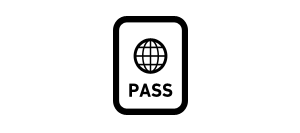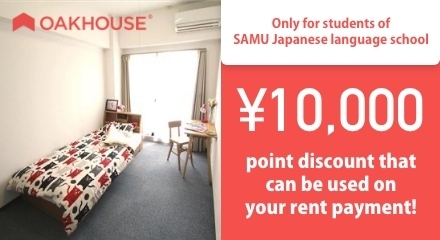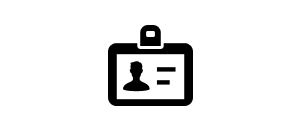

- TOP
- >
- Student Life
- >
- Life in Japan
Preparation and making the proper arrangements are important if you wish to study abroad comfortably.
Below we have listed useful information to make your life easier, from preparation for studying abroad to information on daily life and how to prepare in case of emergency.

Entering the country
Luggage when coming to Japan
The dormitories affiliated with SAMU Language School are pre-furnished.
Additionally, there are shops nearby that offer cheap living necessities such as clothing, food, and other miscellaneous items. When coming to Japan it is acceptable to bring only the minimum necessary clothing and living supplies.
Disembarkation card
The following disembarkation card is required when entering Japan.
Please fill out the necessary items in either English or Japanese.
Disembarkation Card

*If your address in Japan has not yet been decided...
Please fill in the address and phone number of SAMU Language School.
Address:2-1-6 Hyakunin-cho,Shinjuku-ku,Tokyo
TEL:03-3205-2020
Residence card
For those taking a long-term course, residence cards will be issued by the immigration bureau at either Narita Airport or Haneda Airport.
Make sure to keep track of your residence card, as it is an important card for identification if staying in Japan.
At the airport, you can also apply for a special status, "Permission to Engage in Activity Other Than That Permitted under the Status of Residence Previously Granted".
This status is necessary if you are planning on having a part-time job, so please apply if that is the case.
You can also apply for this status at a later date.
If you choose to do so, SAMU will do all it can to assist you.
Residence card

- Front
- Back
Source: Immigration Bureau of Japan homepage, "What is a residence card?"
http://www.immi-moj.go.jp/english/tetuduki/zairyukanri/whatzairyu.html

Daily life
Hanko/inkan (stamp)
In Japan, you may need a stamp, called a hanko or inkan, when signing formal documents or contracts.
Hanko are made at specialty shops, and cost around 500 yen.
They can be made with your name written in either the alphabet or in katakana.
Hanko are used instead of signatures in Japan.
Please make sure to store it in a safe location.

Resident registration and National Health Insurance
Those signed up for a long-term course must register their residence at the city office of the municipality where you are living within 14 days of arriving in Japan.
At that time you also sign up for National Health Insurance.
The insurance fee is approximately 1,500 yen per month for international students, but by signing up 70% of your medical expenses will be covered.
Make sure to sign up for this system so that you can visit the hospital without worry if you get sick or injured while in Japan.
You will be issued a National Health Insurance Card, which you should store in a safe location.
[Required items]
① Passport ② Residence card ③ Admission certificate
Opening a bank account
If your period of stay is less than 6 months, you can open an account with "Japan Post Bank" at the post office, however you will only be able to deposit and withdraw money for 6 months after opening.
Generally, accounts with other banks cannot be opened unless your period of stay is more than 6 months, but please contact us as this depends on individual circumstances.
[Required items]
① Residence card ② Passport ③ Student ID ④ Hanko

Residence
When renting a condo or apartment in Japan, a deposit, "key money", and contract fee may be required in addition to the rent.
Each of these are equal to about one month's rent.
The average rent for a one-room apartment in Tokyo is about 70,000 to 80,000 yen per month, but can be as low as 40,000 yen a month if using a guest house or share house.
Additionally, fees for public utilities such as water, gas, and electricity are generally required in addition to rent.
SAMU also has affiliated dormitories available for use, so please contact us for details if you are interested.

Electricity, gas, and water
Once you have decided upon your residence in Japan, you will need to contact the electric, gas, and water companies for use of their respective utilities.
The price of each depends on use, but in general are around 3,000 to 5,000 yen each per month.
Utility fees can be paid at a post office, bank, or convenience store.
An employee of the gas company must be present when turning on gas for the first time.

For Tokyo
-
TEPCO
TEL:0120-995-001
http://www.tepco.co.jp/en/index-e.html -
Tokyo Gas
TEL:0570-002211
http://www.tokyo-gas.co.jp/en/ -
Bureau of Waterworks, Tokyo Metropolitan Government
TEL:03-5326-1100
http://www.waterworks.metro.tokyo.jp/eng/
Disposing of garbage
Garbage must be separated and thrown away at the designated location on the designated day.
Please follow the rules for the area you live in as well as those for your condo or apartment.
Separating garbage
| Burnable garbage | Recyclable garbage | ||||
| Bottles | Cans | PET bottles | Plastic | Used paper | |
 |
 |
 |
 |
 |
 |

Source : METI Official Website(http://www.meti.go.jp/policy/recycle/main/data/illust/)
Mobile phone contracts
Standard Japanese mobile contracts are 2 years, and there is a cancellation fee if the contract is ended prematurely.
In addition to these, there are also various plans and other pricings available through dealers and home appliance retailers such as prepaid mobile phones, cheap smartphones, cheap SIM cards, and more.
There are a number of dealers near the school.
SAMU will assist you when setting up a contract.
[Required items]
① Residence card ② Student ID ③ Passport ④ Credit card or cash card for a Japanese bank ⑤ Hanko

Japan's major mobile carriers
-
au
https://www.au.com/english/?bid=we-we-gn-1009 -
NTT DoCoMo
https://www.nttdocomo.co.jp/english/ -
SoftBank
https://www.softbank.jp/en/ -
Y! mobile
http://www.ymobile.jp
Home appliances
Eastern Japan, such as Tokyo, uses type A plugs with a voltage of 100 V and 50 Hz frequency.
A transformer or plug adapter will be required if using appliances from your home country.
Mistaken use may cause a fire or malfunction, so be careful when using home appliances and carefully read the instruction manual before use.

International student insurance
At SAMU Language School, all students in a long-term course are required to enroll in international student insurance.
Procedures are handled by the school, and the insurance fees are included in the tuition.
This can reduce the burden of high medical expenses caused by injury or disease that are not covered by the National Health Insurance.
Ex.) If medical expenses require you to pay 30,000 yen, 27,000 yen will be returned to you, with a 3,000 yen deductible.
Commuter passes
There are abundant means of transportation in Tokyo, including trains, subway, buses, and more.
Among these, there are a large number of trains in operation and they are almost always on time.
Suica, PASMO, and other prepaid cards can be used on any line, and if charged can be used on a train or bus just by touching the card to the ticket machine.

Commuter passes
Commuter passes can be purchased with a student discount for the Toei-line and Toei buses.

Facilities surrounding the school
Medical facilities
There are a number of medical institutions near the school, such as general and private hospitals, within a 10-minute walk.
There are also hospitals offering support in languages other than Japanese that you can visit freely, as you will be signed up for insurance.
[General hospitals around SAMU]
Tokyo Yamate Medical Center National Center for Global Health and Medicine Tokyo Metropolitan Health and Medical Treatment Corporation, Ohkubo Hospital
Nearby public facilities
-

Parks
Toyama Park is a 5-minute walk from the school, and there is also Shinjuku Gyoen and Yoyogi Park nearby, two of the most famous parks in Tokyo.
Whether it be taking a walk or enjoying the flowers, you can enjoy yourself, relaxing with the four seasons of Japan. -

Sports facilities
There are sports facilities in Shinjuku-ku, just a 10-minute walk from the school.
Various indoor facilities, such as gymnasiums, pools, fitness clubs, and dojo are available, as well as outdoor facilities for baseball, futsal, 3-on-3, and more. -

Libraries
The school has numerous libraries in the vicinity.
For instance, the Shinjuku Chuo Library, just a 5-minute walk from the school has various information to offer from a "Japanese language learning corner" to information on daily life and events, to even a "consultation desk for foreigners," all of which can be quite useful for those studying abroad.

Part-time work
Before starting a part-time job
International students wishing to take on part-time work will need "Permission to Engage in Activity Other than that Permitted by the Status of Residence Previously Granted ", which is issued by the Immigration Bureau.
Those with short-term visas are not eligible for part-time work.
The "Permission to Engage in Activity Other than that Permitted by the Status of Residence Previously Granted " becomes invalid when your period of stay expires.
You must obtain this permission once again when renewing your visa.
Working hours are limited to a maximum of 28 hours per week (up to 8 hours per day during long holidays).
Working at a job related to the sex industry is not allowed.
Working at a bar or pachinko parlor is also forbidden, even if your duties only include cleaning or handing out fliers.
Working without "Permission to Engage in Activity Other than that Permitted by the Status of Residence Previously Granted " or exceeding your permissible working hours may lead to penalties such as imprisonment, fines, or being forcibly deported.Please obey all rules if you are planning on working.
Searching for part-time work
Work can be found through the Internet, other students, etc.
Additionally, SAMU's group company Bridge Academy, can also assist you in finding part-time work and even help with your resume and the interview process.
While there are jobs available for those who do not speak much Japanese, the higher your Japanese proficiency, the wider your selection of jobs becomes.
Part-time work
A "student visa" is a visa for studying in Japan.
The most important thing for students is to make sure they attend classes every day and study properly.
Part-time work should only be done to the extent that it has no negative impact on your studies.
Additionally, you will not find work right when you arrive in Japan.
The salary for most part-time jobs is at most 100,000 yen a month.
Make sure to plan properly before studying abroad by preparing tuition, living expenses, and other necessary funds beforehand.

Accidents/disasters
Preparing for earthquakes
Prepare an emergency bag/survival kit that includes water, food, medicine,
and clothing. Make sure to be aware of evacuation areas nearby in case of earthquake.
Make sure large furniture is secured so that it does not fall.
Install a disaster warning application on your smartphone.

If an earthquake occurs
- Get under a desk or table to protect your body.
- Keep a look out for falling objects, broken glass, etc.
- When the shaking stops, turn off any gas or fire and open the doors and windows.
- Safely make your way to your closest evacuation area.
In case of emergency
- If there is an accident, call the police (110).
- If there is a fire, sudden illness or injury, call the fire department/ambulance (119).
Give them your name and location, describe what happened, and stay calm.
If Japanese is difficult, please get help from a nearby Japanese speaker.
- police
- 110
- fire
department
/ambulance - 119

Help and inquiries
For inquiries regarding immigration and residence procedures
Ministry of Justice Immigration Bureau "Foreign Residents Information Center"
TEL: 0570-013904 (General) / 03-5796-7112 (IP phones/PHS)
Reception hours: 8:30 - 17:15
Email:info-tokyo@i.moj.go.jp
Consultation regarding daily life (troubles, information)
Shinjuku Ward Office "Foreign resident Advisory Corner"
Address: Shinjuku Ward Office Main Building 1F, 1-4-1 Kabukicho, Shinjuku-ku, Tokyo
TEL: 03-5272-5060 (English) / 03-5272-5070 (Chinese) / 03-5272-5080 (Korean)
Reception hours: Weekdays 9:30 - 12:00, 13:00 - 17:00
Information on Japanese classes, international exchange, daily living, the local government, etc.
Shinjuku Multicultural Plaza " Foreign resident Advisory Corner"
Address: Hygeia 11F, 2-44-1 Kabukicho, Shinjuku-ku, Shinjuku Multicultural Plaza
TEL: 03-5291-5171
Reception hours: Weekdays 10:00 - 12:00, 13:00 - 17:00
Finding a medical facility
Tokyo Metropolitan Medical Institution Information "Himawari"
TEL: 03-5272-0303
http://www.himawari.metro.tokyo.jp/qq13/qqport/tomintop/other/fks240.php
AMDA International Medical Information Center
TEL: 03-5285-8088
